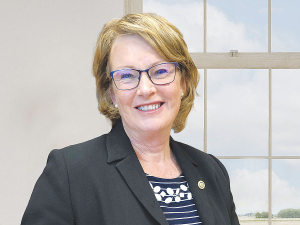Future for ag is bright
OPINION: It is a privilege to welcome you all to this year's Central Districts Field Days, the country's largest regional field days.
 Manawatu District mayor Helen Warboys says the agri-food sector is the region’s largest sector and contributed $310m in GDP to the local economy over the year to March 2021, as well as employing 3,000 people.
Manawatu District mayor Helen Warboys says the agri-food sector is the region’s largest sector and contributed $310m in GDP to the local economy over the year to March 2021, as well as employing 3,000 people.
The Manawatu District has a large and diverse agricultural sector, producing high-quality dairy, red meat and forestry products to the world.
The agri-food sector - which includes primary production, agricultural support services and all secondary food and agricultural manufacturing - is our region's largest sector. It contributed $310m in GDP to the local economy over the year to March 2021 and employs 3,000 people. This is accounts 23% of the Manawatu district's total GDP and 24.1% of its total employment.
Of total the region's agri-food sector activity, primary production makes up $212.0m of agri-food sector GDP. Primary industry support services contribute an additional $27.1m to the local economy, while value-added agri-food manufacturing generates a further $71m to local economic activity.
Of all agricultural activities in the district, dairy production is the largest primary sector earner. The dairy sector contributes $97.4m in GDP and 661 jobs to our local economy.
The contribution of the dairy sector to economic activity in the district is substantially larger than for the New Zealand economy as a whole. To demonstrate the scale of the local industry relative to New Zealand, local dairy production contributed 7.2% of total GDP ($97.4m) and 5.3% of local jobs (661 jobs) to the district economy over the year to March 2021, compared with 2.0% of total national GDP and 1.4% of total jobs.
Dairy production has been a stalwart in the economic performance of the district over a period of substantial disruption and is expected to continue to substantially bolster local economic activity over 2022.
The Manawatu district has had substantial professional, scientific and technical services industry, which has grown around our dominant food producing industries over the last 20-years.
Primary industry employment is the largest contributor to our local economy - creating 1,723 jobs. Primary production support services contribute a further 346 local jobs, while value-added manufacturing employs a further 930 people.
A Rural Hub
Feilding boasts the largest stock saleyards in the Southern Hemisphere and they are situated in the town centre.
These saleyards attract buyers and sellers from around NZ on a bi-weekly basis and are a key contributor to local retail, hospitality and the professional business community.
The rural town is also home to Manfeild Park, with an agri event stadium which hosts many diverse agricultural and equestrian events - such as the Central District Field Days, NZ Dairy Event and A&P Shows.
Helen Worboys is Mayor of Manawatu District.
Agrisea NZ has appointed Craig Hudson as it's new chief growth officer.
State farmer Landcorp, trading as Pamu, is a forecasting a full-year net profit of around $100 million.
Tony Aitken, chief executive of Ruralco, has been awarded the Excellence in Business Leadership Award at the ANZ Business of the Year Awards.
Global trade has been thrown into another bout of uncertainty following the overnight ruling by US Supreme Court, striking down President Donald Trump's decision to impose additional tariffs on trading partners.
Controls on the movement of fruit and vegetables in the Auckland suburb of Mt Roskill have been lifted.
Fonterra farmer shareholders and unit holders are in line for another payment in April.

OPINION: Here w go: the election date is set for November 7 and the politicians are out of the gate…
OPINION: ECan data was released a few days ago showing Canterbury farmers have made “giant strides on environmental performance”.